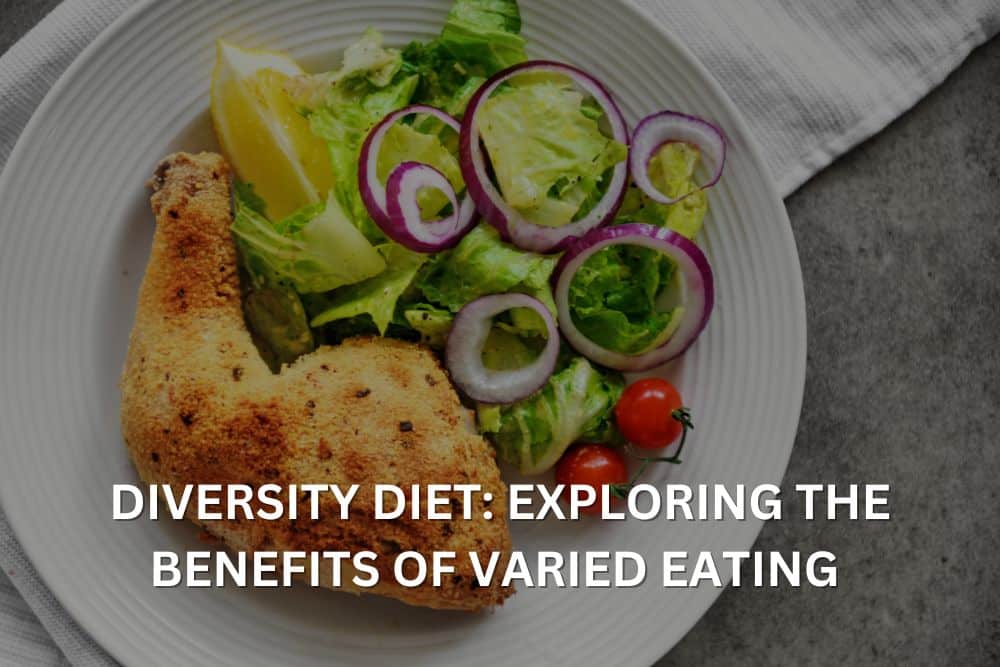
At 121 Dietitian, our days are spent educating others, which we absolutely love!
Some individuals seek to improve their diets to help with health conditions or enhance sporting performance, while others aim to improve overall wellness and longevity.
With the diverse range of people we see, there is one crucial aspect we ensure: a “diversity diet” or eating a varied diet. What does this mean, and why is it important?
Let’s dive into the world of dietary diversity and explore its potential benefits and challenges.

What is a Diversity Diet?
A diversity diet, simply put, is an eating pattern that includes a wide variety of foods from all food groups. It’s not about restricting certain foods or following strict rules, but rather about embracing a broad range of nutrients through different food choices.
The concept is based on the idea that no single food contains all the nutrients we need for optimal health. By eating a diverse range of foods, we increase our chances of getting all the essential nutrients our bodies require.
You would be surprised at how many people do not eat a diverse diet and feel happy eating the same foods over again.
Unfortunately, f these foods are ultra processed and beige this is not recommended for longer-term health risks. An unhealthy diet increases blood pressure, diabetes, heart disease, cancer, obesity mental health issues and much more.
Benefits of a Diverse Diet:
- Nutrient Adequacy - Different foods provide different nutrients. By eating a variety of quality foods, you're more likely to meet your body's nutritional needs.
- Gut Health - A diverse diet can support a healthy gut microbiome. Our gut bacteria thrive on different types of fibre from various plant foods.
- Reduced Risk of Deficiencies - Eating a wide range of foods can help prevent nutrient deficiencies that might occur from a limited diet.
- Enjoyment and Satisfaction - Variety in our diet can make eating more enjoyable and satisfying, which can help with long-term adherence to healthy eating habits.
- Exposure to Beneficial Compounds - Different foods contain various phytochemicals and antioxidants that may have health benefits.
Challenges of a Diverse Diet While a diverse diet has many benefits, it’s not without challenges:
- Cost: Some people might find that buying a wide variety of foods, especially fresh produce, can be more expensive.
- Time and Effort: Preparing meals with a variety of ingredients can be more time-consuming and require more planning.
- Availability: Depending on where you live, access to a wide variety of foods might be limited.
- Food Preferences: Some people, especially children, might resist trying new foods, making it challenging to introduce variety.
- Celery juice may also interact with certain medications like blood thinners because of its vitamin K content.
How to Increase Dietary Diversity
- Try New Foods: However take your time, make it a goal to try one new healthy food each week.
- Eat the Rainbow: Choose fruits and vegetables of different colours to ensure a variety of nutrients.
- Vary Your Protein Sources: Alternate between different types of meat, fish, eggs, and plant-based proteins.
- Experiment with Whole Grains: Try different types of whole grains like quinoa, barley, or millet instead of always relying on wheat or rice.
- Explore Different Cuisines: Different cultures often use a variety of ingredients and cooking methods, which can help increase dietary diversity.
- Shop Seasonally: Buying seasonal produce can naturally increase variety throughout the year.
- Mix Up Your Meals: Try not to eat the same meals every week. Rotate your recipes and try new combinations.
The Science Behind Dietary Diversity Research has shown that dietary diversity can have positive impacts on health. A study published in the American Journal of Clinical Nutrition found that greater dietary diversity was associated with a lower risk of metabolic syndrome, a cluster of conditions that increase the risk of heart disease, stroke, and diabetes.
Another study in the British Journal of Nutrition found that higher dietary diversity was associated with better nutritional adequacy in adults. This means that people who ate a more varied diet were more likely to meet their nutritional needs. However, it’s important to note that not all studies have found clear benefits to dietary diversity.
Some research suggests that too much diversity, particularly if it includes a lot of unhealthy foods, could lead to overeating and weight gain. This highlights the importance of focusing on variety within healthy food groups, rather than just eating a wide range of any foods.
Dietary Diversity and Gut Health One area where dietary diversity seems particularly important is gut health. Our gut is home to trillions of bacteria, known as the gut microbiome. These bacteria play crucial roles in our health, from supporting our immune system to influencing our mood.
We know from the research that a diverse diet can lead to a more diverse gut microbiome, which is generally considered healthier. Different types of fibre from various plant foods feed different types of gut bacteria, helping to maintain a balanced and diverse microbiome.
A study published in the journal Nature found that people who ate more than 30 different plant foods per week had more diverse gut microbiomes than those who ate 10 or fewer. This diversity was associated with lower levels of antibiotic resistance genes in the gut, which could have implications for overall health.
Case Study: Sarah’s Journey to Dietary Diversity
Sarah, a 35-year-old working full time, came to see us at 121 Dietitian because she was feeling constantly tired and had frequent digestive issues. Upon reviewing her diet, Abby the dietitian noticed that Sarah’s meals were quite repetitive.
She typically ate the same breakfast every day (toast with peanut butter), had a sandwich for lunch, and rotated between three or four dinner recipes. Abby suggested that Sarah try to increase the diversity in her diet.
We worked together to create a plan:
- Breakfast: Instead of always having toast, Sarah started alternating between oatmeal with different toppings, Greek yoghurt with fruit and nuts, and whole-grain toast with avocado and eggs.
- Lunch: Sarah began preparing different salads with a variety of vegetables, proteins, and whole grains.
- Dinner: Sarah committed to trying one new recipe each week and incorporated more variety into her usual meals by changing up the vegetables and grains.
- Snacks: Instead of always reaching for crackers or crisps, Sarah started snacking on a variety of fruits, vegetables with hummus, and nuts.
After three months of following this more diverse eating pattern, Sarah reported significant improvements. Her energy levels had increased, and her digestive issues had largely resolved and she was sleeping better.
She also found that she enjoyed her meals more and felt more satisfied after eating. Blood tests showed improvements in her nutrient levels, particularly in vitamins and minerals that had previously been low.
Sarah’s case demonstrates how increasing dietary diversity with the support of a Dietitian can lead to improvements in both subjective feelings of wellbeing and objective measures of health.
While the concept of a “diversity diet” is still being researched, the evidence so far suggests that eating a healthy varied diet can have numerous health benefits. It can help ensure we get all the nutrients we need, support our gut health, and make eating more enjoyable.
Our findings at 121 Dietitian is to be aware if consuming for a few reasons:
- Overconsumption – those with gut symptoms looking for a gut reset can end up too long on this and cause issues with malnutrition and disordered eating where they struggle to resume foods into their diet again.
- Bone broth can in the sensitive person trigger histamine intolerance which can increase not decrease symptoms so need to be mindful.
- Glutamates present can trigger anxiety and pain if sensitive.
Coconut Water
Coconut water is high in potassium and can help balance out sodium levels in your body, potentially reducing water retention and bloating. It’s also naturally hydrating, which can help prevent constipation.
Care however needs to be taken with drinking coconut water as the high potassium levels can be dangerous for those with poor kidney function, and those who are active it may not be the answer for your electrolyte balancing.
Remember, while these foods and drinks may help reduce bloating for many people, everyone’s digestive system is different. What works for one person may not work for another. It’s always a good idea to introduce new foods gradually and pay attention to how your body responds.
We hope you found this information interesting and helpful in addressing the original question and although some people may find celery juice helpful in reducing bloating, it’s not a one-size-fits-all solution. If you decide to try celery juice, pay attention to how your body responds.
For many individuals, making simple lifestyle changes and dietary adjustments can be more effective in reducing bloating. If bloating persists or is accompanied by severe pain, it’s important to consult with a healthcare professional to rule out any underlying conditions.
121 Dietitian are experts in gut health and are available to assess and assist you worldwide.
If you want to book your programme TODAY we would love to help you.
You can book a 121 Dietitian Programme today by clicking on the link below
Links included in this description might be Amazon affiliate links. If you purchase a product or service with the links that I provide I may receive a small commission.
